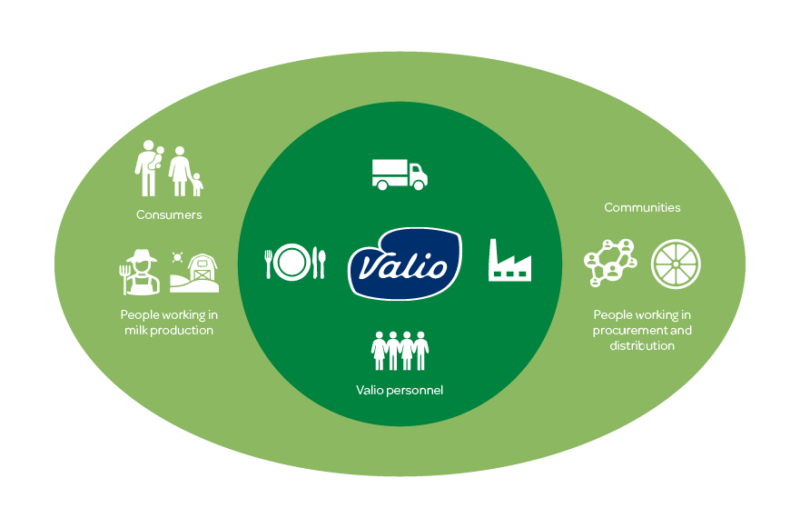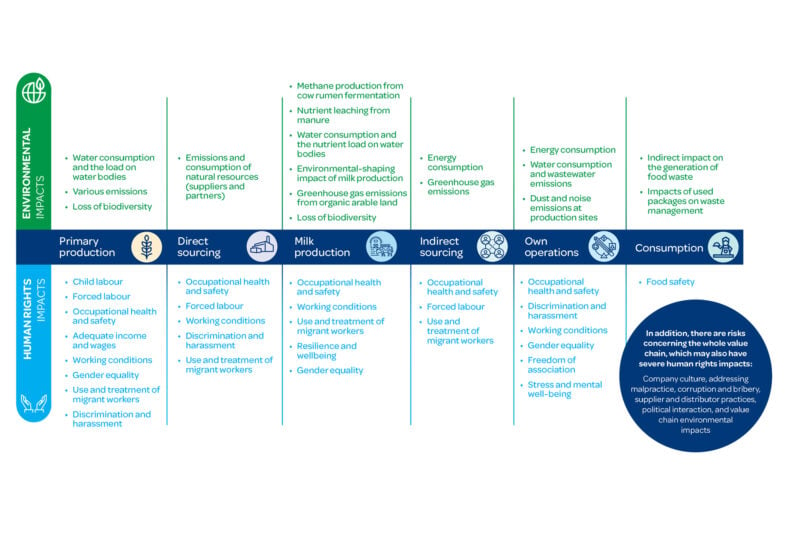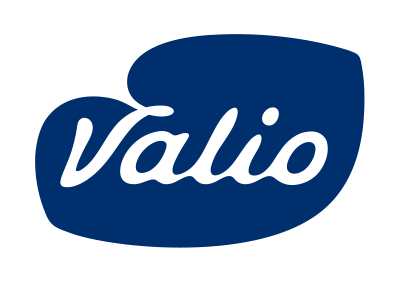
Human rights
In line with its Code of Conduct, Valio is committed to respecting human rights and ethical business operations. We have identified Valio’s human rights impacts and we manage them through a human rights due diligence process.
Management of human rights work
Respecting human rights in the Valio Executive board level is the responsibility of the director, whose areas of responsibility are brand and marketing, sustainability, communication and public affairs. Our human rights work is headed by Valio’s Senior Vice President of Group Sustainability, who reports about its work to management. The implementation of Valio’s human rights due diligence process is directed by Valio’s Sustainability Manager through social responsibility team activities.

Valio’s internal policies and the mutual interaction among Valio employees have a direct impact on our employees. The outer perimeter of the graphic shows the people who are indirectly impacted by Valio’s own operations or its supply chain. Included in communities are the people who may be impacted by Valio’s operations (product marketing, transportation, neighbourhoods around the plants, etc).
Human rights impact assessment
Assessing human rights impacts in part of Valios materiality assessment and human rights due diligence process. Valio’s human rights impacts assessment is based on the Danish Institute of Human Rights (DIHR) compliance assessment tool as well as on several external and internal sources, such as observation and reporting channels, audits, employee surveys, and country- and sector-specific human rights reports.
When possible, the relevant parties are engaged to assist in identifying the human rights impacts; such parties include the stakeholders targeted by the assessment, as well as experts on the subject (e.g., industry organisations, trade unions, etc.), whose opinions are heard as part of the assessment process.
The calculation of the magnitude of the human rights risk is based on the assessment of the overall severity, that is average of (volume, gravity, remediability.) Based on the assessment, the risks over the defined threshold are raised as the most significant human right impacts of Valio.
The image below shows the environmental and human rights impacts of Valio’s value chain. Click on the image to see it larger.

Among Valio’s most significant human rights impacts, we regularly prioritise those which we will take measures on. We monitor the selected measures as part of function-specific operating plans and within the scope of the social sustainability operating plan.
Human rights impact monitoring, and remediation
The realisation of human rights is continuously monitored through internal and external reporting channels. Internal grievances can be reported e.g., through the Valio Whistle Channel in which case they are managed according to a separately defined process. Expressions of concern may also come through several other sources, channels or persons. The way they are handled, as well as the responsible parties, vary depending on the reported issue.
Valio is committed to remedying and compensating/reimbursing for a possibly realised human rights violation where necessary, considering its own relationship with the impact (caused, contributed, linked).
Assessing human rights impacts is not a one-time task
The timeliness of human rights impacts and the effectiveness of measures taken are assessed at least every three years by reviewing the existing assessments and the measures implemented. We systematically broaden the assessment of human rights impacts to a more detailed level as the function-level work advances.
A review of a human rights impacts assessment is initiated also in connection with the following events:
- New functions/new business
- Significant changes in the external operating environment
- Significant changes in internal operations
- A new impact, risk, or perspective relevant to Valio’s operations that is reported through some channel and which must be taken into consideration
Human rights impacts communications
We communicate Valio’s human rights impacts and work externally as part of Valio’s Sustainability Report, through stakeholder collaboration, and on Valio’s website.
We communicate internally about human rights as part of social responsibility communications and training.






